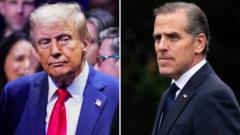In an unexpected twist, Joe Biden and Donald Trump, two political figures often seen as opposites, find themselves invoking similar defenses in light of legal troubles. As Biden announced a “full and unconditional” pardon for his son, Hunter Biden, he labeled the prosecution as biased, asserting, “No reasonable person who looks at the facts of Hunter’s cases can reach any other conclusion than Hunter was singled out only because he is my son – and that is wrong." This stark condemnation of what he views as a politicized judicial system resonates with the sentiments expressed by Trump regarding his own legal challenges.
Trump, embroiled in a New York City case over hush-money payments, maintained that the charges against him typify a "witch hunt" orchestrated to thwart his political ambitions. He has repeatedly characterized the legal challenges he faces as unfounded, politically motivated attacks designed to undermine his candidacy.
The legal scenarios of Biden and Trump share notable similarities; both cases sprang to life in 2024, several years after the events which sparked the prosecutions. Trump’s alleged misconduct with Stormy Daniels is tied to actions from 2016, while Hunter Biden’s issues, involving a flawed gun application and tax returns, stem from between 2016 and 2019. These prosecutions were unexpected twists, initially thought to be closing on grounds for dismissal or plea deals, both ultimately pivoting back into the spotlight.
Their cases underscore a puzzling overlap in how the judicial system applies existing laws under varying conditions. Trump’s campaign finance violations, which his lawyers argue are purely federal contraventions, have also faced scrutiny under state law provisions that historically have seen less enforcement. Meanwhile, Hunter’s legal predicaments, traditionally not warranting criminal liabilities, found themselves amplified by the political atmosphere surrounding the Bidens.
Despite noticeable differences—such as the fact that Hunter Biden has never held public office and Trump's legal battles span serious alleged crimes—public discourse on each case reflects deep-seated concerns over politicization in justice. The prevailing narrative implies that both politicians are leveraging their legal predicaments to critique the political framework in which they exist.
Academic voices suggest that perceptions of political influence in prosecutorial decisions might overshadow the complexities of the law itself, a gap in public understanding that could fuel claims of inequity in the administration of justice, especially for prominent figures.
As the legal landscapes morph around both men, questions about accountability linger—while Hunter Biden faces no consequences for his actions thanks to his father’s pardon, Trump remains poised to leverage the political ramifications of his situation as he campaigns for his return to office. The entwined fates of Biden and Trump cast a spotlight on the larger narrative of American political trust, as both continue to navigate tumultuous waters, using their legal battles to galvanize support from their respective bases.
Trump, embroiled in a New York City case over hush-money payments, maintained that the charges against him typify a "witch hunt" orchestrated to thwart his political ambitions. He has repeatedly characterized the legal challenges he faces as unfounded, politically motivated attacks designed to undermine his candidacy.
The legal scenarios of Biden and Trump share notable similarities; both cases sprang to life in 2024, several years after the events which sparked the prosecutions. Trump’s alleged misconduct with Stormy Daniels is tied to actions from 2016, while Hunter Biden’s issues, involving a flawed gun application and tax returns, stem from between 2016 and 2019. These prosecutions were unexpected twists, initially thought to be closing on grounds for dismissal or plea deals, both ultimately pivoting back into the spotlight.
Their cases underscore a puzzling overlap in how the judicial system applies existing laws under varying conditions. Trump’s campaign finance violations, which his lawyers argue are purely federal contraventions, have also faced scrutiny under state law provisions that historically have seen less enforcement. Meanwhile, Hunter’s legal predicaments, traditionally not warranting criminal liabilities, found themselves amplified by the political atmosphere surrounding the Bidens.
Despite noticeable differences—such as the fact that Hunter Biden has never held public office and Trump's legal battles span serious alleged crimes—public discourse on each case reflects deep-seated concerns over politicization in justice. The prevailing narrative implies that both politicians are leveraging their legal predicaments to critique the political framework in which they exist.
Academic voices suggest that perceptions of political influence in prosecutorial decisions might overshadow the complexities of the law itself, a gap in public understanding that could fuel claims of inequity in the administration of justice, especially for prominent figures.
As the legal landscapes morph around both men, questions about accountability linger—while Hunter Biden faces no consequences for his actions thanks to his father’s pardon, Trump remains poised to leverage the political ramifications of his situation as he campaigns for his return to office. The entwined fates of Biden and Trump cast a spotlight on the larger narrative of American political trust, as both continue to navigate tumultuous waters, using their legal battles to galvanize support from their respective bases.




















